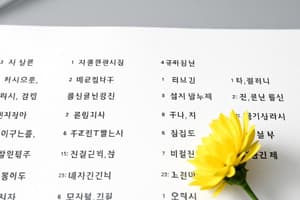Podcast
Questions and Answers
What is the purpose of using honorific language in Korean?
What is the purpose of using honorific language in Korean?
- To speak informally with friends
- To show respect to the listener, subject, or topic (correct)
- To show disrespect to the listener
- To use only with people of similar age or social status
What is the difference between (gamasida) and (gada)?
What is the difference between (gamasida) and (gada)?
- They are both formal words
- They are both informal words
- (gada) is formal and (gamasida) is informal
- (gamasida) is formal and (gada) is informal (correct)
What is the meaning of the proverb (mok-eun jae-ui gwang-ye)?
What is the meaning of the proverb (mok-eun jae-ui gwang-ye)?
- The mouth is the door to happiness
- The house is the door to happiness
- The house is the foundation
- The mouth is the door to disaster (correct)
What is the origin of the word (gyosu, teacher)?
What is the origin of the word (gyosu, teacher)?
What is the level of politeness of the formal polite (jondaemal)?
What is the level of politeness of the formal polite (jondaemal)?
What is the meaning of the idiomatic expression (neomu meolli-ga isseoyo)?
What is the meaning of the idiomatic expression (neomu meolli-ga isseoyo)?
Flashcards are hidden until you start studying
Study Notes
Vocabulary
Formal and Informal Language
- Formal language (, jondaemal): used in writing, formal speeches, and when speaking to someone who is older or in a position of authority
- Informal language (, banmal): used with friends, family, and people of similar age or social status
Honorifics
- Honorific language (, johap-eui eoneo): used to show respect to the listener, subject, or topic
- Six levels of honorifics:
- Extremely polite (, jondaemal)
- Polite (, jondaemal)
- Formal polite (, jondaemal)
- Informal polite (, banmal)
- Intimate (, haengbok-eui eoneo)
- Blunt (, gaseum-eui eoneo)
Word Choice
- Formal and informal words:
- Formal: (gamasida, to go) vs. Informal: (gada, to go)
- Formal: (meokda, to eat) vs. Informal: (mokda, to eat)
- Words with different connotations:
- (jip, home) - more formal
- (tae, home) - more informal
Idiomatic Expressions
- Proverbs (, salm-eui haengbok):
- (mok-eun jae-ui gwang-ye, "The mouth is the door to disaster")
- (jip-eun jok-eul, "The house is the foundation")
- Idiomatic expressions (, eui-hwa):
- (neomu meolli-ga isseoyo, "It's really far")
- (joh-ah-ha-go sip-eo-yo, "I like it and miss it")
Sino-Korean Vocabulary
- Words borrowed from Chinese (, hanja):
- (gyosu, teacher)
- (hakgyo, school)
- Words with Chinese characters (, hanja):
- (seon-mul, gift)
- (jung-won, garden)
- : , ,
- : , ,
- : , ,
- 6: + + + + + +
- , :
- : ,
- : ,
- , :
- :
- :
- :
- :
- :
- :
- :
- :
- :
- :
- :
- :
- :
- :
Studying That Suits You
Use AI to generate personalized quizzes and flashcards to suit your learning preferences.




